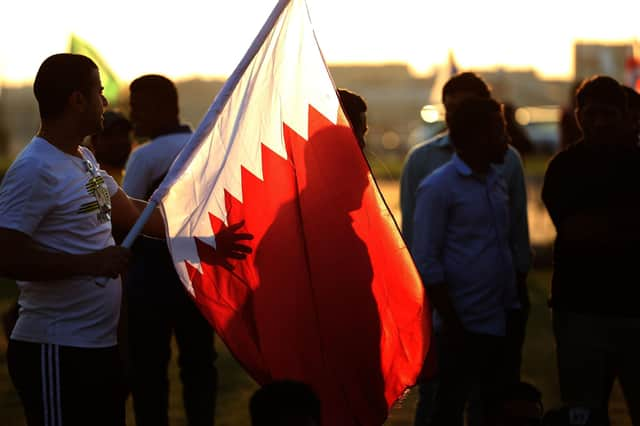World Cup 2022: How Qatar 'brand' being fed through the shredder could yet salvage these finals


It can’t, and won’t, ever be forgotten or forgiven that FIFA allowed one of the greatest expressions of joyous global togetherness to mutate into a receptacle for humanity’s ills. Greed, grotesque monetary outlay and, most inexcusably, the denial of rights for women, migrant workers and the LGBTQI community, and the trashing of the very planet itself with an emissions disaster. Those will be the unbudgeable associations that forever spring to mind for the wider populace when they contemplate the competition being staged in a tiny, oil-producing desert Gulf state.
However, to these finals there may come to be attached another black mark that would amount to a grain of beauty among the sandy expanses of beastliness: a full stop on sportswashing. Qatar unquestionably sought to bathe in such fashion by inviting the football world to its little known, or understood, nation. Only for that to backfire spectacularly; for the impression of their regime – authoritarian, it should be remembered – that they wanted to promote simply not to wash across this orb.
Advertisement
Hide AdAdvertisement
Hide AdIt could seem hopelessly naive to believe the Qatar World Cup might prove a tipping point over sportswashing. A woke dream. Except for the fact that among those harbouring the opinion hosting the finals has wrought monumental reputational damage to Qatar would appear to be no less than the country’s Supreme Committee for Delivery and Legacy.
The esteemed journalist Jon Sopel this week provided a fascinating insight over that development on the LBC podcast and radio programme The News Agents, which he hosts with Emily Matliss. Revealing he had spoken to someone close to the committee, he said the Qatari assessment of their World Cup staging had become ‘why have we bothered?’ Sopel explained their thinking amounted to despair over the fact “we have spent £200 billion on this, we are vilified over LGBTQ rights, we are attacked for being corrupt over the manner we got the World Cup. We are seen as Victorian in our labour laws and the way our guest workers have been treated. Nothing good has come to us from this. It has been a giant waste of money and [we] wish it would all go away, but it can’t”.
Words and gestures of protest, rightly, tend to be dismissed as having little lasting effect. But the constant condemnation of FIFA’s Qatari folly from all quarters, which in no way has diminished even with the tournament in full swing – as few of us suspected would be so – has cut through in unprecedented fashion. Qatar’s ‘brand’ has been fed through the shredder. The bans placed on both the wearing of the OneLove armbands by a number of European captains – which led to Germany’s hands-over-mouths riposte as they assembled for their pre-match team photograph the other day – and fans sporting rainbow hats at games has continued to stoke widespread ire.
As a result, and even perhaps unjustly, having previously not been considered one of the Middle East’s big bads, Qatar are being called out in damning terms normally reserved for what is certainly one of those in Saudi Arabia. A state which in the past fortnight alone has beheaded 17 prisoners, this grizzly form of capital punishment often meted out in arbitrary fashion, according to human rights organisations.
Indeed, when it comes to the rejection of sportswashing, how the world has turned on Qatar can be contextualised with reference to previous moves by the Saudi sovereign oil fund in the domain. In 2011, when Qatari Sports Investments bought Paris Saint-Germain, the objections were largely centred on the club being in receipt of state aid. Human rights were barely given an airing. It was an altogether different story when 13 months ago the Saudi's Public Investment Fund took control of Newcastle United. The vociferous moral objections dwarfed any financial considerations. Likewise, with the LIV Golf breakaway tour established in June. The players who signed up were publicly castigated in brutal fashion. Even as the governments of the American and British players who chased eye-watering sums have made arms sales to the kingdom, whose rulers ordered the murder of a journalist Jamal Khashoggi four years ago, that total more than £100 billion since 2015.
If Qatar must wish they had their time again over bidding for the World Cup in an, ehem, flawed process in 2010, FIFA will surely be pledging never again over such an ill-conceived staging for their showpiece even. They may have doubled down in defending Qatar – many toes are surely yet to uncurl after FIFA president Gianni Infantino’s certifiable monologue calling out European “hypocrisy” on the eve of last Sunday’s opener – but privately the governing body must also be offering up ‘why have we bothered?’ Now, FIFA’s reputation has long appeared about as lowly as a snake’s belly.
Somehow, though, Qatar’s hosting of the World Cup has succeeded in taking it to subterranean levels. And, even if it isn’t much, they may require to offer up at least one sop. The campaign to have migrant workers and their families compensated over the estimated 7,000 deaths and many, many more thousands of on-site incidents remains live. Organised by Amnesty International, fans groups, and trade union organisations, the #PayUpFIFA initiative, which demands £440m – the prize money of the 32 competing nations – be set aside from the £6 billion profits for such a programme was described by FIFA deputy general secretary Alasdair Bell at a Council Of Europe five weeks ago as “certainly something that we are interested in progressing”. We’ll see. As we will also have to see over whether FIFA and Qatar utterly failing to get away with their mirage of acceptability will cause others to think twice about attempting similar. At least the resounding repudiation of these finals offers an iota of hope.